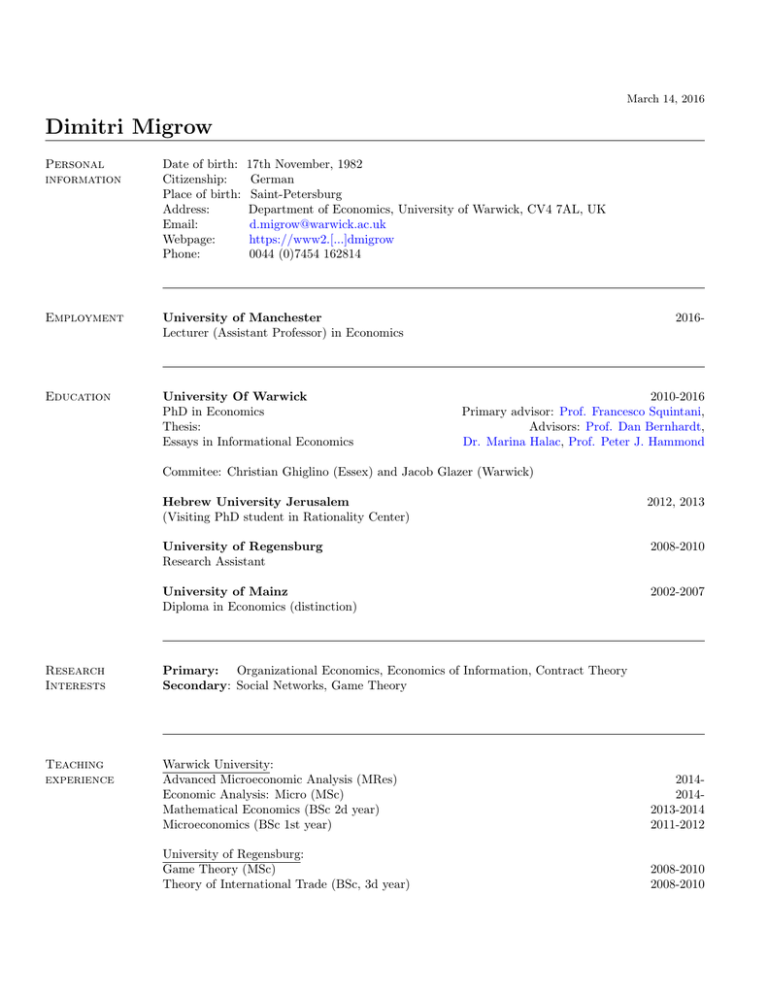Dimitri Migrow
advertisement

March 14, 2016 Dimitri Migrow Personal information Date of birth: Citizenship: Place of birth: Address: Email: Webpage: Phone: 17th November, 1982 German Saint-Petersburg Department of Economics, University of Warwick, CV4 7AL, UK d.migrow@warwick.ac.uk https://www2.[...]dmigrow 0044 (0)7454 162814 Employment University of Manchester Lecturer (Assistant Professor) in Economics Education University Of Warwick PhD in Economics Thesis: Essays in Informational Economics 2016- 2010-2016 Primary advisor: Prof. Francesco Squintani, Advisors: Prof. Dan Bernhardt, Dr. Marina Halac, Prof. Peter J. Hammond Commitee: Christian Ghiglino (Essex) and Jacob Glazer (Warwick) Hebrew University Jerusalem (Visiting PhD student in Rationality Center) 2012, 2013 University of Regensburg Research Assistant 2008-2010 University of Mainz Diploma in Economics (distinction) 2002-2007 Research Interests Primary: Organizational Economics, Economics of Information, Contract Theory Secondary: Social Networks, Game Theory Teaching experience Warwick University: Advanced Microeconomic Analysis (MRes) Economic Analysis: Micro (MSc) Mathematical Economics (BSc 2d year) Microeconomics (BSc 1st year) 201420142013-2014 2011-2012 University of Regensburg: Game Theory (MSc) Theory of International Trade (BSc, 3d year) 2008-2010 2008-2010 Awards and Positions Seminars and conferences Teaching Fellowship Conference Attendance Fellowship, 5th Lindau Nobel Laureate Meeting Scholarship of the Centre for Competitive Advantage in the Global Economy (Economic and Social Research Council) Nominated by Students for the Warwick University Awards for Teaching Excellence Erasmus Scholarship 20132014 2010-2013 2013 2005-2006 2016: Kellogg School of Management (Northwestern, Chicago), Autonoma Economics (Barcelona), HEC Paris, Manchester Economics, Maastricht Economics, University of Vienna Economics, CUNEF (Madrid) Econometric Society, 2015 Winter Meeting (Job Market Paper accepted) Dec 15-16, 2015 Warwick PhD conference 2014 CAGE workshop, Warwick 2013 Sergiu’s Hart student seminar in Rationaly Center, Jerusalem 2012 Computer skills LATEX, Mathematica, Office, Matlab (basic) Languages English: Fluent. German: Fluent. Working Papers Designing Communication Hierarchies to Elicit Information (Job Market Paper), 2015. Russian: Mother tongue. Latin: Basic. A central problem in organizations is that much of the information relevant for decision making is dispersed among employees who are biased and may lack the incentives to communicate their information to the management. This paper studies how a manager can elicit employees’ information by designing a hierarchical communication network. The manager decides who communicates with whom, and in which order, where communication takes the form of cheap talk (Crawford and Sobel, 1982). I show that the optimal network is shaped by two competing forces: an intermediation force that calls for grouping employees together and an uncertainty force that favours separating them. The manager optimally divides employees into groups of similar bias. Under simple conditions, the optimal network features a single intermediary who communicates directly to the manager. Communication and Delegation in a Game With Evidence, 2015. This paper studies a novel trade-off between centralization and decentralization with two experts and a decision maker, when experts receive noisy and complementary evidence. There is a single decision to be made, the decision maker can allocate the decision right to any of the experts, and can commit to communication channels betweent the players. I study conditions under which delegation combined with decentralized communication outperforms centralization. This happens because delegation encourages information sharing between the experts. Two conditions have to be satisfied in order for a decision maker to benefit from decentralization. First, the expert who decides over policy has to be not too biased towards the decision maker. Second, he should have a smaller distance to the bias of the other expert compared to the DM. In this case, the other expert is willing to reveal more information to the first expert compared to the centralized case. Publications in refereed journals References The Resolution Game: A Dual Selves Perspective. In: Games, 2011, 2, 452-462. Prof Francesco Squintani (primary advisor) Department of Economics University of Warwick Coventry CV4 7AL United Kingdom Tel: +44(0) 2476 52 3446 Email: f.squintani@warwick.ac.uk Prof Dan Bernhardt (advisor) Department of Economics University of Illinois 214 David Kinley Hall Illinois 61801, United States Tel: +1 (217) 333-0120 Email: danber@illinois.edu Dr Marina Halac (advisor) Department of Economics Warwick Uni (and Columbia Business School) Coventry CV4 7AL United Kingdom Tel (in US): 212-851-5864 Email: M.Halac@warwick.ac.uk Prof Peter J. Hammond, FBA (advisor) Department of Economics University of Warwick Coventry CV4 7AL United Kingdom Tel: +44(0) 2476 52 3052 Email: p.j.hammond@warwick.ac.uk Prof Jeremy Smith (teaching) Department of Economics University of Warwick Coventry CV4 7AL United Kingdom Tel: +44(0) 2476 52 3336 Email: Jeremy.Smith@warwick.ac.uk
